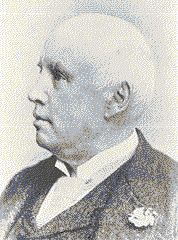
Visit the birthplace of Robert G. Ingersoll (by Fred Edwords)
(1833-1899), American lawyer and orator, known as the Great Agnostic because of his antireligious views.
He was born in Dresden, N.Y., on Aug. 11, 1833. Even though his father was an enthusiastic Congregationalist preacher, Ingersoll early developed a distaste for strict religion. In 1858 he settled in Peoria, Ill., to practice law and served as attorney general of Illinois from 1867 to 1869. His own efforts to enter politics were thwarted because of his antireligious views, but he gained fame as a spokesman for such politicians as James G. Blaine and Rutherford B. Hayes (who later became president).
Ingersoll became a celebrity as a lecturer. His talks scandalized orthodox clergy. Yet he had his own humanistic creed: the belief that happiness is the only good and that the way to be happy is to make others so. Ingersoll wrote over 20 antiorthodox lectures, including "Why I Am an Agnostic" (1896). He died in Dobbs Ferry, N.Y., on July 21, 1899.
"An honest god is the noblest work of man." --- Robert G. Ingersoll, The Gods, and Other Lectures [This line is also found in Samuel Butler's Note-Books . Both men were parodying Alexander Pope]
"I suppose it can be truthfully said that Hope is the only universal liar who never loses his reputation for veracity." --- Robert G. Ingersoll , speech (1892)
"Our hope of immortality does not come from any religions, but nearly all religions come from that hope." --- Robert G. Ingersoll, quoted in Chicago Times
"In nature there are neither rewards nor punishments_there are consequences." --- Robert G. Ingersoll , Some Reasons Why
"The present is the necessary product of all the past, the necessary cause of all the future." --- Robert G. Ingersoll , lecture (1899)
"No man with any sense of humor, ever founded a religion." --- Robert G. Ingersoll , Prose-Poems and Selections
"I am the inferior of any man whose rights I trample under foot." --- Robert G. Ingersoll , "Liberty"
"Our hope of immortality does not come from any religions, but nearly all religions come from that hope." --- Robert G. Ingersoll , quoted in Chicago Times
Ingersoll, Robert Green \'in-ger-.sol, -sel\ . 1833-1899. American lawyer and orator, b. Dresden, N.Y. Commanded Illinois volunteer cavalry regiment in Civil War; attorney general of Illinois (1867-69). Became noted agnostic lecturer, attacking popular Christian beliefs. Author of The Gods, and Other Lectures (1876), Some Mistakes of Moses (1879), Why I Am an Agnostic (1896), Superstition (1898).
Copyright Funk and Wagnalls Encyclopedia